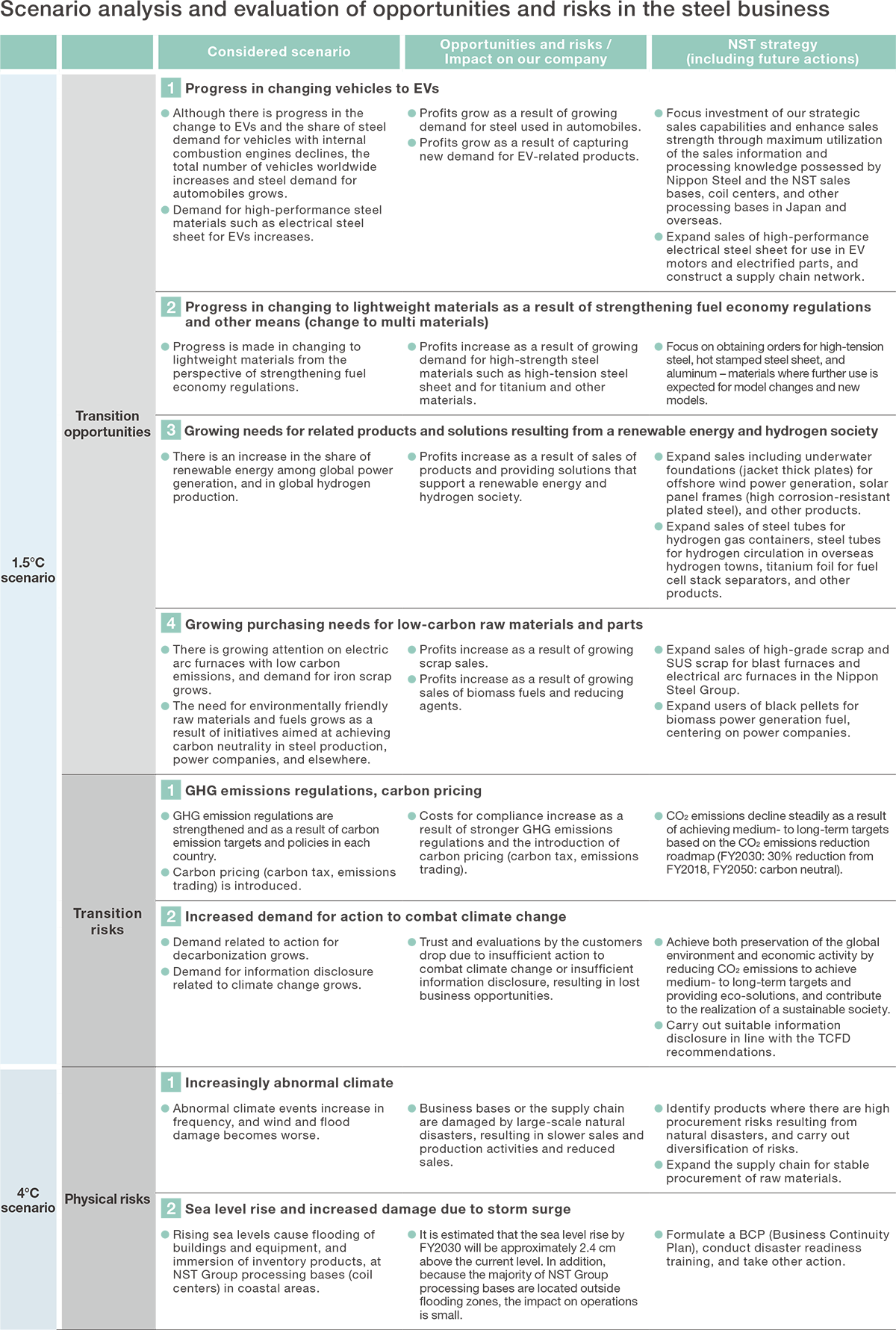Preventing Climate Change
Preventing Climate Change
The NST Group has established “contributing to a decarbonized society and environmental conservation” as one materiality related to ESG management. By reducing CO2 emissions, proposing eco-solutions through our business, and other means, with the goal of becoming carbon neutral in 2050, we are aiming to achieve both preservation of the global environment and economic activity, and contribute to the creation of a sustainable society. In May 2022, we announced our agreement to the TCFD (Task Force on Climate-related Financial Disclosure) recommendations, and we have been carrying out information disclosure in line with the TCFD framework regarding the impacts of our business activities on climate change and carrying out Group-wide initiatives aimed at achieving carbon neutrality.
CO2 emission results
■Scope1・Scope2
The NST Group has established targets consisting of a 30% reduction by fiscal 2030 (compared to fiscal 2018) and achieving carbon neutrality by 2050. CO2 emissions in fiscal 2023 were 28,800 t-CO2, a reduction of around 15% from fiscal 2018. Because approximately 80% of CO2 emissions in the NST Group result from the use of electrical power, we are enacting a range of energy-saving measures such as switching to LED lighting at the plants and offices of Group companies, and turning off lights during lunch breaks. We are also steadily installing solar power generating systems and switching to CO2-free power produced from renewable energy at the Head Office and Group companies. We are on pace to achieve an approximately 3% reduction in emissions on average for the fiscal year, exceeding the target (2.5%).
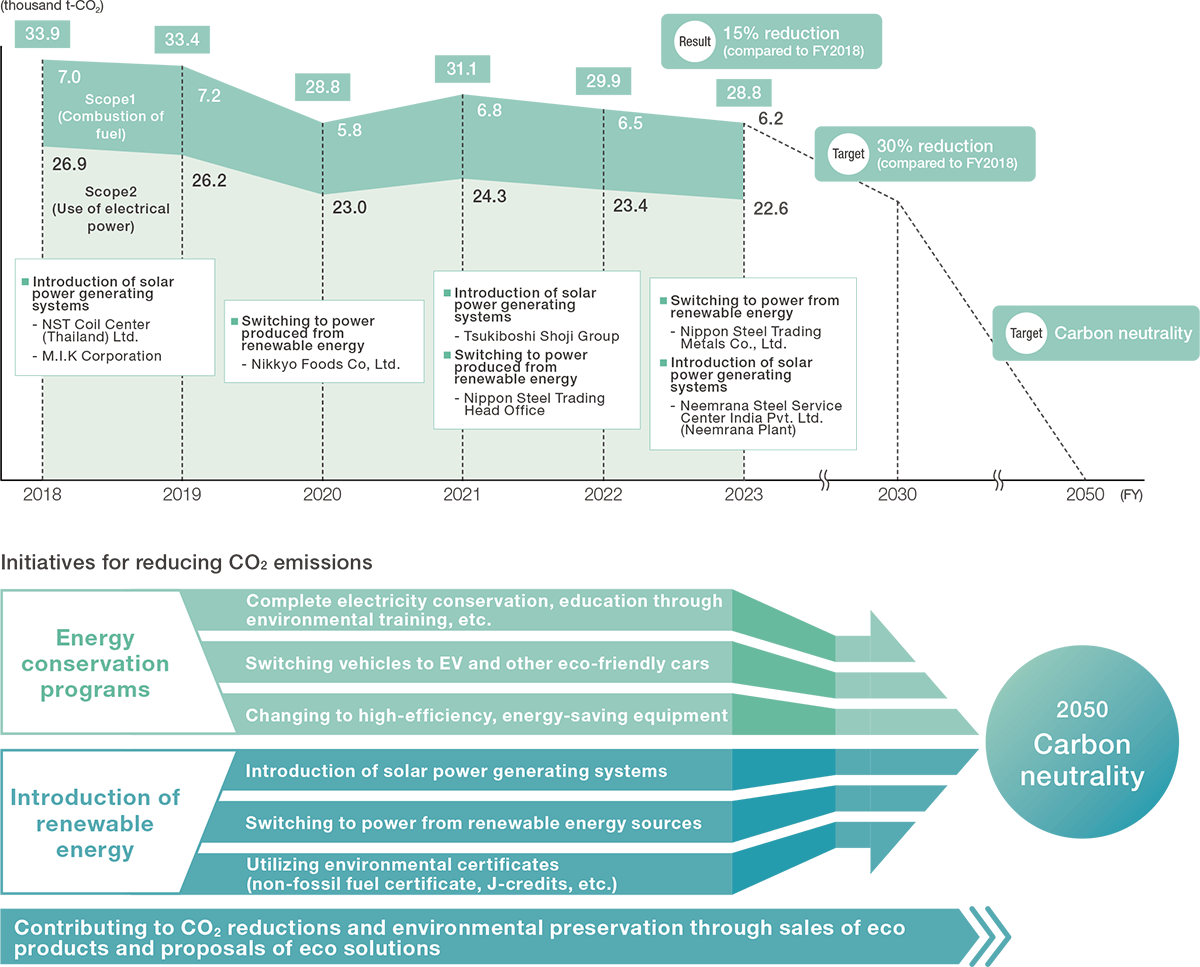
■Scope3
As the first step in reducing CO2 emissions throughout the supply chain, NST began visualizing Scope3 emissions in fiscal 2022, and has gradually been expanding the calculation range. In fiscal 2023, we calculated and disclosed figures for nine (2 - 8, 13 - 14) of the 15 categories, and will continue to expand the calculation range in the future.
Initiatives for reducing CO2 emissions (Scope1 and Scope2)
- 1.Introduction of solar power generating systems
We are actively proceeding with the installation of solar power generating systems at coil centers and other facilities in Japan and overseas where CO2 emissions are large. We have so far completed installation at five sites, and have decided on installation at four additional sites by the end of fiscal 2026.

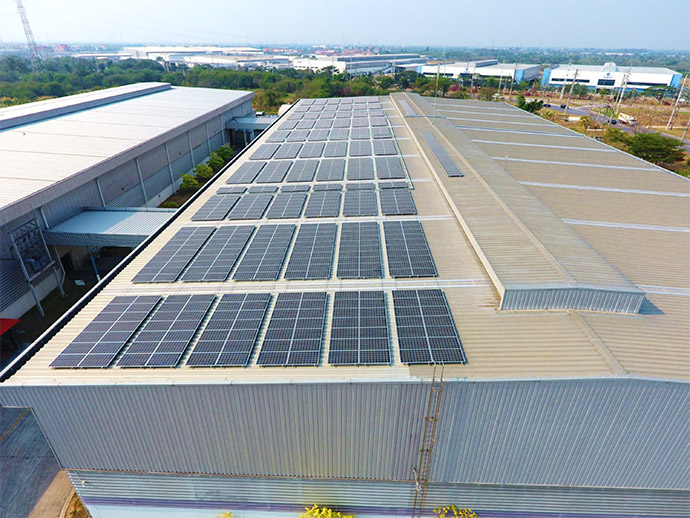
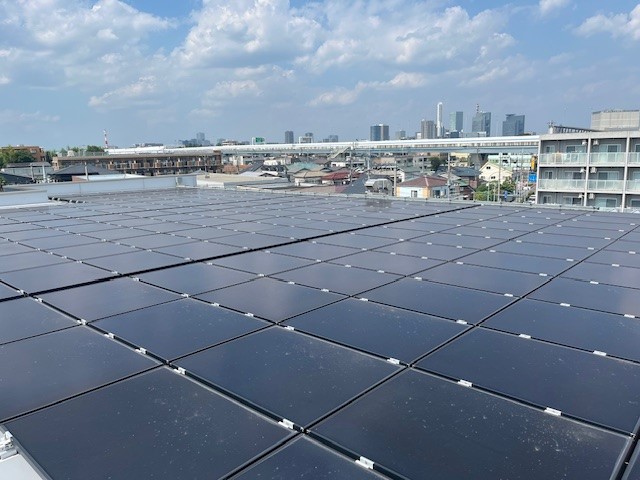

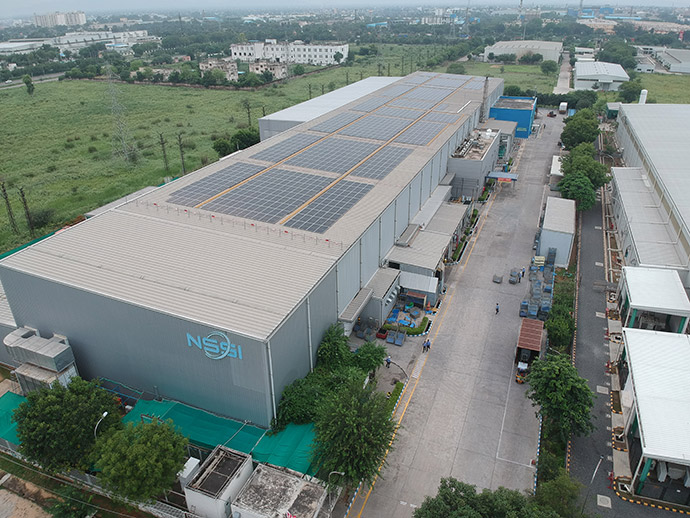
India Pvt.Ltd. (Neemrana Plant)
- 2.Use of non-fossil fuel certificates and other certification
Beginning from March 2022, we have switched to electrical power produced from renewable energy sources utilizing non-fossil fuel certificates for all electrical power used at the NST Head Office in Tokyo. In the future, we will switch to a menu of electrical power from renewable energy sources, and will make use of non-fossil fuel certificates, J-credits, and other environmental certification, at offices, branch offices, and sales offices to rapidly achieve materially zero CO2 emissions at the company. - 3.Introduction of an internal carbon pricing system
In order to proceed with installing energy-saving and CO2-reducing equipment in the NST Group, in June 2024 we introduced an internal carbon pricing system. The set internal carbon prices are applied to equipment investment that is expected to reduce CO2 emissions, and we are incorporating these prices into our investment decisions.- Overview of the internal carbon pricing system
Internal carbon price:10,000 yen/t-CO2
Subject investments:Equipment investments that contribute to reducing CO2 emissions in the NST Group
Application method:The internal carbon prices are applied to CO2 emissions and emission reductions resulting from investment in subject equipment, and we are incorporating these prices into our investment decisions.
- Overview of the internal carbon pricing system
Information disclosure based on TCFD recommendations
Governance
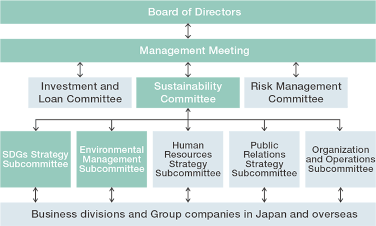
From the perspective of promoting sustainability, NST has constructed a Sustainability Promotion System intended to improve corporate governance, enhance ESG management, and further strengthen risk management. As part of this, the Sustainability Committee that is chaired by the President is held twice every year, and we consider basic policies and measures related to promotion of our ESG management, including matters related to climate, comprehensively and across the entire NST Group. The SDGs Strategy Subcommittee and Environmental Management Subcommittees are subordinate bodies of the Sustainability Committee and carry out implementation and follow-up of various climate-related and other measures. The issues considered and discussed by the Sustainability Committee are reported to and discussed by the Management Meeting and Board of Directors at least once each year. The Board of Directors carries out regular supervision of this process, and provides instructions for action as necessary.
Strategies
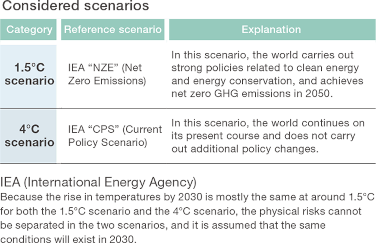
The TCFD recommendations include performing analysis based on multiple climate scenarios when disclosing strategies. In our primary business area of steel, our company has analyzed risks and opportunities, and studied the impact on our business, using 2030 as the time frame and based on two scenarios: one scenario in which the measures necessary are carried out to limit the average rise in global temperatures to less than 1.5°C compared to pre-industrial revolution times, and one scenario in which these measures are not carried out and global average temperatures rise by 4°C.
Risk management
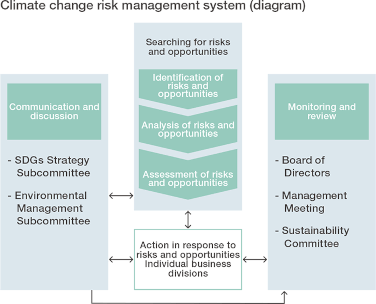
NST identifies the risks and opportunities resulting from climate change, and operates an effective PDCA (plan, do, check, act) management cycle in order to carry out improvements. For identification, analysis, assessment, and action in response to climate change risks and opportunities, an internal cross-organizational project team was established and conducted studies. The Sustainability Committee considers and discusses the identified risks and opportunities, and then reports the results for discussion by the Management Meeting and Board of Directors.
Indexes and targets
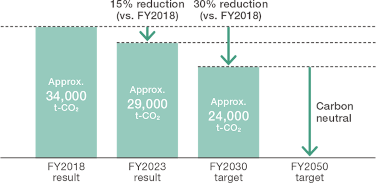
In May 2021, the NST Group identified six priority issues (materiality) related to ESG management, one of which is “contributing to a decarbonized society and environmental conservation.” We have decided CO2 emission reduction targets for Scope 1 and Scope 2 consisting of a 30% reduction (as compared to fiscal 2018) in fiscal 2030 and achieving carbon neutrality in fiscal 2050, and are taking action to eliminate carbon emissions.
For the NST Group, because approximately 80% of CO2 emissions are caused by the use of electrical power, we are carrying out a variety of energy conservation programs including introducing solar power generating systems, switching vehicles to EV and other eco-friendly cars, and changing to high efficiency, energy-saving equipment, and are also systematically switching to power from renewable energy sources and utilizing environmental certificates (non-fossil fuel certificate, J-credits, etc.), in order to achieve our targets.
